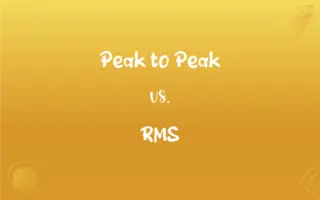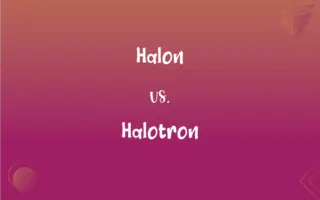Otherwise vs. Else: What's the Difference?
Edited by Aimie Carlson || By Harlon Moss || Published on December 26, 2023
"Otherwise" indicates a different state or condition that would occur if something didn't happen, while "else" is used to refer to an additional or alternative person, thing, or situation.

Key Differences
"Otherwise" is typically used to indicate what the result would be if the current situation were different, often implying a negative outcome. "Else," in contrast, is used to refer to an additional or alternative person, thing, or situation, without the negative connotation.
In usage, "otherwise" often links two clauses, suggesting a cause and effect relationship, where the first part of the sentence presents a condition and the second part presents a consequence. "Else" is commonly used in questions or after indefinite pronouns to suggest other possibilities.
"Otherwise" can also be used to mean 'in other respects' or 'apart from that', adding a different dimension to a statement. "Else" is frequently paired with "anything," "anyone," "somewhere," etc., to denote an unspecified alternative.
"Otherwise" is often used to provide a warning or indicate the negative outcome of not following a certain path. "Else" typically offers options or alternatives without implying a threat or warning.
The tone of "otherwise" can imply a certain urgency or importance to the condition being discussed. In contrast, "else" is more neutral, simply providing other options or asking for additional information.
ADVERTISEMENT
Comparison Chart
Function in Sentence
Indicates a different state or outcome if conditions change
Refers to an additional or alternative option
Connotation
Often implies a negative outcome if conditions aren’t met
Neutral, suggesting other possibilities
Usage with Pronouns
Not typically used with pronouns
Commonly used with indefinite pronouns (anything, anyone)
Tone
Can imply urgency or importance
Neutral, offering alternatives
Common Pairings
Used with conditions (if, unless)
Paired with "what," "where," "who" to ask for alternatives
ADVERTISEMENT
Otherwise and Else Definitions
Otherwise
Indicating different results under different conditions.
Wear a coat, otherwise you'll get cold.
Else
Used to refer to an additional person or thing.
Do you need anything else?
Otherwise
In a different manner or state.
She acted otherwise than expected.
Else
In addition; besides.
What else can we do?
Otherwise
Used to suggest that something is true under different circumstances.
He seems quiet, but otherwise, he's very friendly.
Else
Used to suggest a possible alternative.
Where else can we go?
Otherwise
Apart from that; in other respects.
The car is old but otherwise reliable.
Else
Different; other.
Is there anyone else here?
Otherwise
If not; or else.
You must follow the rules; otherwise, there will be consequences.
Else
Otherwise; in other circumstances.
Who else could have done it?
Otherwise
In another way; differently
She thought otherwise.
Else
Other; different
Ask somebody else.
Otherwise
Under other circumstances
Otherwise I might have helped.
FAQs
Can "else" be used to ask for alternatives?
Yes, "else" is commonly used to ask for alternative options.
Is "else" neutral in tone?
Yes, "else" is typically neutral, offering additional options.
How is "else" used with indefinite pronouns?
"Else" is frequently paired with pronouns like "anything," "anyone," to suggest other possibilities.
Does "otherwise" imply a negative outcome?
Often, "otherwise" suggests a negative outcome if conditions change.
Is "otherwise" used to indicate consequences?
Yes, "otherwise" often indicates potential consequences of not meeting a condition.
Is "otherwise" suitable for formal writing?
Yes, "otherwise" is appropriate for both formal and informal contexts.
Is "otherwise" used in warnings?
Yes, "otherwise" can be used to warn about negative outcomes.
Can "otherwise" be used to mean 'in other respects'?
Yes, "otherwise" can indicate 'apart from that' or 'in other respects'.
Can "otherwise" start a sentence?
Yes, "otherwise" can start a sentence, especially when summarizing or concluding.
How does "else" function in questions?
In questions, "else" asks for additional or alternative information.
Does "else" have a formal alternative?
"Else" is straightforward and doesn't have a more formal alternative.
Can "else" follow conditional clauses?
Yes, "else" can follow conditional clauses, offering alternatives.
Does "otherwise" imply a contrast?
"Otherwise" often implies a contrast between actual and potential situations.
Is "otherwise" used in idiomatic expressions?
Yes, "otherwise" appears in various idiomatic expressions.
Can "else" be used at the end of a sentence?
Yes, "else" is often placed at the end of a sentence or question.
Does "otherwise" always relate to a condition?
Mostly, "otherwise" relates to a condition and its potential outcome.
Can "otherwise" modify an entire clause?
Yes, "otherwise" can modify or qualify an entire clause.
Can "else" be used in formal documents?
Yes, "else" is appropriate for both formal and informal contexts.
Is "else" used to offer choices?
Yes, "else" is commonly used to offer or inquire about different choices.
Is "else" commonly used in everyday language?
Yes, "else" is a common word in both spoken and written language.
About Author
Written by
Harlon MossHarlon is a seasoned quality moderator and accomplished content writer for Difference Wiki. An alumnus of the prestigious University of California, he earned his degree in Computer Science. Leveraging his academic background, Harlon brings a meticulous and informed perspective to his work, ensuring content accuracy and excellence.
Edited by
Aimie CarlsonAimie Carlson, holding a master's degree in English literature, is a fervent English language enthusiast. She lends her writing talents to Difference Wiki, a prominent website that specializes in comparisons, offering readers insightful analyses that both captivate and inform.








































































